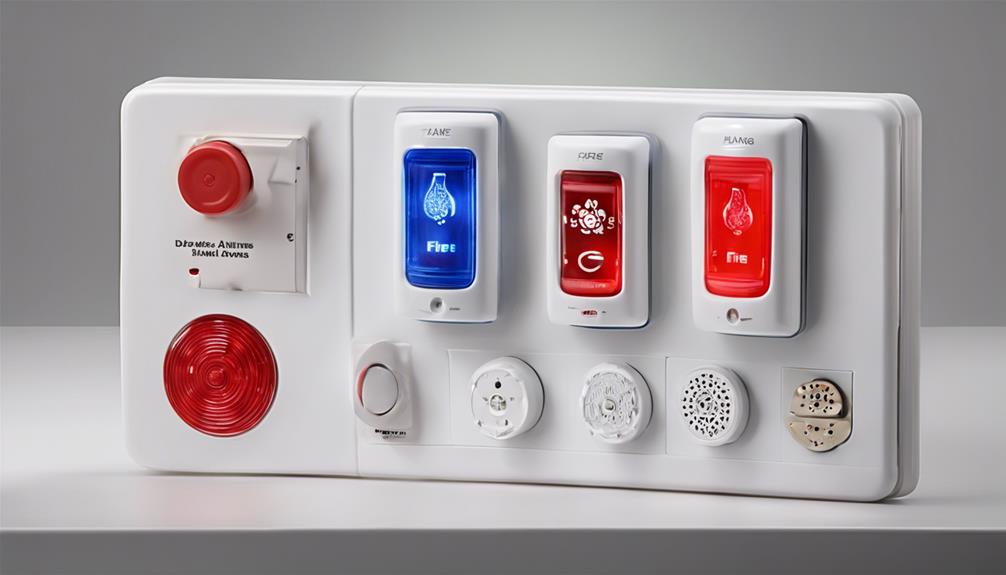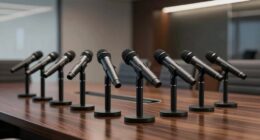Embarking on Maria’s Deaf Cruise is like going on a voyage aboard a ship where each wave brings a tune of empathy and a breeze of inclusiveness.
Imagine being surrounded by a community that speaks your language without uttering a word.
The experience is not just a vacation; it's a journey of connection and empowerment.
Join us as we navigate the waters of possibility and redefine the way we explore the world.
Key Takeaways
- Tailored cruise experience for hearing-impaired travelers with specialized accommodations and services
- Communication support services including sign language classes and aids for effective interaction
- Entertainment and accessibility features like visual performances and alerts for inclusivity
- Curated destinations and activities focusing on communication enhancement and inclusivity for an immersive experience
Overview of Maria's Deaf Cruise
What makes Maria's Deaf Cruise a unique and inclusive experience for hearing-impaired travelers?
Maria's Deaf Cruise stands out as a groundbreaking initiative specifically tailored to meet the needs of individuals with hearing loss. From specialized accommodations to communication services, every aspect of the cruise is designed to ensure inclusivity and accessibility for all participants. The cruise not only offers a chance to explore exciting destinations but also provides a supportive environment where hearing-impaired travelers can feel empowered and connected. The itinerary is carefully curated to include activities and excursions that cater to diverse needs, making sure that everyone can fully participate and enjoy the experience.
Maria's Deaf Cruise is more than just a typical vacation; it's a transformative journey that fosters a sense of community among individuals with hearing loss. By creating a space where everyone feels understood and valued, the cruise goes beyond traditional travel offerings to deliver a truly innovative and enriching experience for all participants.
Inclusive Community on Board

We understand the importance of feeling supported and included while traveling, especially for individuals with hearing impairments.
On board the deaf cruise, we offer sign language classes to enhance communication among guests, as well as provide a range of communication aids to ensure everyone can participate fully.
Our supportive staff members are dedicated to creating a welcoming environment where all passengers feel valued and connected throughout their journey.
Sign Language Classes
Sign language classes offered onboard create a welcoming and inclusive community for hearing-impaired travelers on Maria's Deaf Cruise Experience. Experienced instructors provide personalized instruction tailored to varying skill levels, enhancing sign language proficiency through interactive lessons. Learning sign language fosters a sense of connection and community among passengers with hearing loss, enriching the travel experience. Access to these classes encourages cultural exchange and mutual understanding, promoting inclusivity and communication.
- Personalized instruction from experienced instructors
- Interactive and engaging lessons
- Fosters a sense of connection and community
- Encourages cultural exchange
- Promotes inclusivity and communication
Communication Aids Available
Passengers aboard Maria's Deaf Cruise Experience benefit from a range of communication aids designed to ensure an inclusive and comfortable environment for all guests, including assistive listening devices, sign language interpreters upon request, closed captioning services for entertainment, and amplified telephones for enhanced communication accessibility. Additionally, the cruise provides hearing aids, further enhancing the experience for hearing-impaired travelers. The table below highlights some of the communication aids available onboard:
| Communication Aids | Description |
|---|---|
| Assistive Listening Devices | Devices to help amplify sounds for better communication. |
| Sign Language Interpreters | Available upon request with advance notice to assist in communication. |
| Closed Captioning Services | Provided for shows and movies onboard to aid in entertainment accessibility. |
Supportive Staff Members
The trained cruise ship staff members create a supportive and inclusive community on board, ensuring all passengers feel welcomed and accommodated. Our team goes above and beyond to cater to the needs of hearing-impaired travelers, fostering a warm and understanding environment for everyone. Here's how our supportive staff members make a difference:
- Providing communication assistance tailored to individual needs.
- Facilitating interactions among guests to enhance social engagement.
- Being prepared to address any challenges or special requirements related to hearing impairments.
- Cultivating a welcoming and inclusive atmosphere for all passengers to feel at ease.
- Undergoing specialized training to effectively communicate and assist hearing-impaired travelers throughout the journey.
Specialized Communication Services Provided

We understand the importance of clear communication for all passengers. Sign language interpreters are readily available for group activities and shows onboard, ensuring everyone can participate fully.
Additionally, closed captioning services and assistive listening devices can be requested to enhance the overall cruise experience for those needing specialized communication support.
Communication Assistance Offered
Enhancing communication for travelers with hearing impairments, Maria's Deaf Cruise offers specialized services such as sign language interpreters. We understand the importance of effective communication and strive to provide innovative solutions to ensure all passengers can fully participate in the cruise experience.
To assist hearing-impaired travelers, we offer the following communication assistance:
- Closed captioning for shows and movies
- Assistive listening devices
- Dedicated accessibility coordinators
- Trained crew members to assist with communication challenges
- Tailored support for passengers with hearing loss
At Maria's Deaf Cruise, we're committed to creating an inclusive environment where everyone can enjoy their time on board without any communication barriers.
Sign Language Interpreters
Moving seamlessly from the communication assistance offered, our specialized sign language interpreters at Maria's Deaf Cruise ensure a fully inclusive experience for hearing-impaired travelers. These interpreters play a crucial role in facilitating interactions and activities for deaf passengers throughout the cruise.
By having interpreters proficient in sign language on board, we guarantee that all individuals can engage, participate, and enjoy every aspect of the journey. Deaf travelers rely on these skilled professionals to bridge communication gaps effectively, fostering a sense of belonging and connection within the community.
Tailored communication support, such as sign language interpreters, is instrumental in creating a welcoming environment that prioritizes accessibility and inclusivity for all passengers on Maria's Deaf Cruise.
Fun Activities for All Participants

Fun activities await all participants on Maria's Deaf Cruise, ranging from themed dance parties to interactive sign language classes and guided nature walks. Whether you prefer hitting the dance floor or exploring the serene outdoors, there's something for everyone to enjoy onboard. Here are some highlights of the exciting activities available:
- Themed Dance Parties and Karaoke Nights: Get your groove on and showcase your singing talent in a vibrant and inclusive setting.
- Interactive Workshops: Engage in enriching sessions like sign language classes and art workshops to learn new skills and connect with fellow travelers.
- Outdoor Adventures: Embark on guided nature walks and participate in group games that foster camaraderie and exploration of the surrounding environment.
- Mindfulness and Wellness: Unwind with calming mindfulness sessions, rejuvenating yoga classes, and pampering spa treatments for a holistic experience.
- Special Performances: Enjoy unique performances that incorporate visual elements, catering to diverse sensory experiences and enhancing entertainment for all participants.
Accessibility Features and Accommodations

At the heart of ensuring an inclusive experience for all passengers lie essential accessibility features and accommodations.
Sign language interpreters, tactile vibration alerts, and visual emergency notifications are just a few of the crucial provisions available onboard.
These thoughtful additions cater to diverse needs, enhancing the overall cruise experience for everyone on board.
Sign Language Interpreters
Sign language interpreters play a vital role in enhancing accessibility and communication for hearing-impaired passengers during Maria's deaf cruise experience. These interpreters assist in various situations onboard to ensure a smooth and inclusive journey. Here are some key points to understand their significance:
- Onboard Availability: Interpreters are readily available to assist passengers throughout the cruise.
- Communication Aid: They help with interactions, shows, and activities, promoting engagement.
- Advance Requests: Prearranging interpreters ensures effective communication during the trip.
- Information Facilitation: Interpreters aid in understanding announcements, safety protocols, and entertainment.
- Enhanced Experience: Access to sign language interpreters enriches the overall cruise experience for deaf travelers.
Tactile Vibration Alerts
Navigating from the essential role of sign language interpreters, tactile vibration alerts on Maria's Deaf Cruise provide crucial accessibility features for immediate notifications and alerts tailored to hearing-impaired passengers.
These tactile vibration alerts use vibrations to convey important information, allowing passengers to feel notifications for announcements, emergencies, and updates.
By offering tactile alerts, the cruise ensures equal access to information for all travelers, enhancing the overall experience through inclusive communication methods.
This innovative feature not only caters to the specific needs of hearing-impaired individuals but also demonstrates a commitment to creating a welcoming and accommodating environment for all passengers aboard Maria's Deaf Cruise.
Visual Emergency Notifications
Visual emergency notifications on Maria's Deaf Cruise, incorporating flashing lights and visual alarms, play a vital role in ensuring prompt and effective responses from hearing-impaired travelers during emergency situations. These accessibility features are strategically placed throughout the ship to alert passengers quickly.
- Clear visual cues enhance safety for all passengers.
- Visual alarms provide peace of mind, especially for those with hearing impairments.
- Designated flashing lights indicate emergency situations clearly.
- The visual notifications are easily visible in various areas of the cruise ship.
- These accommodations prioritize the safety and inclusivity of all travelers.
Building Connections With Fellow Travelers

As travelers on Maria's Deaf Cruise, we come together to forge meaningful connections with our fellow participants, creating a supportive and understanding community onboard. The shared experience of navigating the world with hearing impairment forms a strong bond among us.
Conversations flow easily as we exchange stories of triumphs and challenges related to our cochlear journeys. These interactions go beyond surface-level small talk; they delve into the depths of our unique experiences, fostering empathy and camaraderie. Networking opportunities abound, allowing us to learn from each other's strategies for overcoming obstacles and celebrating successes.
The cruise environment provides a safe space where friendships can blossom naturally, built on a foundation of mutual understanding and respect. Through these connections, we not only enrich our own lives but also contribute to the vibrant tapestry of the deaf community, united in our shared journey of exploration and connection.
Benefits of Traveling With Maria's Deaf Cruise

Traveling with Maria's Deaf Cruise offers a range of tailored benefits that enhance the overall experience for hearing-impaired passengers. On a Maria's Deaf Cruise, individuals with hearing loss can expect the following advantages:
- Specialized Accommodations: Cruise lines are equipped with accommodations designed to cater to the needs of hearing-impaired travelers, ensuring comfort and convenience throughout the journey.
- Communication Services: Dedicated communication services are available onboard to facilitate seamless interactions and enhance the overall travel experience.
- Accessible Itinerary: The cruise itinerary is carefully crafted to prioritize accessibility, allowing passengers to fully engage in all activities and destinations without barriers.
- Inclusive Environment: Maria's Deaf Cruise fosters a supportive and inclusive environment where individuals with hearing loss feel welcomed and valued.
- Tailored Experience: Passengers can enjoy a cruise experience specifically tailored to meet the unique needs and preferences of hearing-impaired travelers, ensuring a memorable and fulfilling journey.
Testimonials From Previous Participants

Praised for its specialized communication services and accommodating crew members, Maria's Deaf Cruise has garnered enthusiastic testimonials from previous participants highlighting the inclusive environment tailored to their needs. Travelers expressed gratitude for the seamless access to assistive listening devices and interpreters, emphasizing the cruise's commitment to making every aspect of the journey accessible. Many attendees, who are deaf or hard of hearing, felt a sense of belonging and appreciation for the unique social connections forged during the voyage.
Participants were particularly impressed by the supportive nature of the crew members, who went above and beyond to ensure everyone felt included and understood. Testimonials often mentioned the profound impact of being in a space where communication barriers were minimized, allowing for a truly immersive and enjoyable experience. The positive feedback underscores the importance of creating spaces and services that cater to the specific needs of individuals with hearing impairments, making Maria's Deaf Cruise a standout choice for inclusive travel experiences.
Tips for a Smooth Experience

For a smooth experience on Maria's Deaf Cruise, ensure you communicate your specific needs to the cruise staff for tailored accommodations. Utilize special communication services and devices provided onboard for enhanced experiences. Request smaller dining groups or seating arrangements for better communication during meals. Seek assistance from crew members for clarity in challenging situations. Embrace the unique experiences and support available for hearing-impaired travelers on Maria's Deaf Cruise.
When embarking on Maria's Deaf Cruise, effective communication is key to maximizing your enjoyment. Here are some tips to help you make the most of your experience:
- Communicate Your Needs: Inform the cruise staff of any specific requirements you have for tailored accommodations.
- Utilize Communication Services: Take advantage of the special communication services and devices provided onboard for a more immersive experience.
- Request Suitable Seating: Ask for smaller dining groups or seating arrangements that facilitate better communication during meals.
- Seek Crew Assistance: Don't hesitate to seek help from crew members when faced with challenging situations that require clarity.
- Embrace the Experience: Embrace the unique experiences and support offered to hearing-impaired travelers on Maria's Deaf Cruise.
Destinations and Itineraries Offered

Exploring the world through Maria's Deaf Cruise unveils a carefully curated selection of destinations and itineraries tailored to enhance the travel experiences of hearing-impaired individuals. Our itineraries include accessible locations with accommodations for hearing loss, focusing on enhancing communication and providing inclusive experiences. Designed with the needs of hearing-impaired passengers in mind, specialized tours and activities are offered to create a supportive and inclusive environment for deaf travelers to explore different destinations. One of the highlights of our itineraries is the opportunity to engage in various water sports, providing a thrilling and immersive experience for all participants. Below is a glimpse of the diverse destinations and activities you can enjoy on Maria's Deaf Cruise:
| Destinations | Activities |
|---|---|
| Caribbean Islands | Snorkeling |
| Mediterranean | Jet Skiing |
| Alaska | Whale Watching |
| Hawaii | Surfing |
| Australia | Scuba Diving |
Embark on a journey filled with adventure, cultural exploration, and unforgettable moments tailored to meet the unique needs of hearing-impaired travelers.
How to Join Maria's Deaf Cruise

To become a part of Maria's Deaf Cruise, we invite you to connect with our team for detailed information on booking and joining this unique travel experience catered specifically to hearing-impaired individuals. Our team is here to assist you every step of the way, ensuring a smooth and enjoyable process from start to finish.
Here's how you can join Maria's Deaf Cruise:
- Contact Us: Reach out to our dedicated team for booking inquiries and additional information.
- Specialized Itinerary: Explore the specially curated itinerary designed for deaf travelers.
- Inclusive Activities: Engage in activities and excursions tailored to accommodate hearing-impaired guests.
- Supportive Environment: Experience a cruise environment that prioritizes inclusivity and support for deaf passengers.
- Tailored Experience: Enjoy a unique travel experience where every detail is thoughtfully planned to cater to the needs of the hearing-impaired community.
Contact us today to embark on an unforgettable journey with Maria's Deaf Cruise.
Frequently Asked Questions
How Much Is the Royal Caribbean Deaf Cruise 2024?
The Royal Caribbean Deaf Cruise 2024 offers various accommodation options with different pricing tiers.
- Inside cabins start at $1,500 per person
- Oceanview cabins are priced at $1,700
- Suites are available for $2,000
The cruise fare covers a range of activities, entertainment, and dining experiences. Additional charges may apply for excursions and specialty dining.
What Makes Maria’s Deaf Cruise a Unique Experience for Hearing-Impaired Travelers?
Maria’s Deaf Cruise offers a one-of-a-kind experience for hearing-impaired travelers, providing a supportive and inclusive environment for all. From specialized sign language interpreters to tailored excursions, there are countless reasons to join deaf cruise and connect with others in the deaf community while exploring the world.
How Can Deaf Individuals Communicate and Enjoy Maria’s Deaf Cruise?
Deaf individuals can communicate and enjoy Maria’s Deaf Cruise by following specific dating tips for deaf individuals. They can use sign language, written notes, or text messages to connect with others. By being open and patient, they can develop meaningful relationships and make the most of the cruise experience.
Conclusion
In conclusion, Maria's Deaf Cruise offers a truly unique and enriching experience for hearing-impaired travelers. With a focus on inclusivity, specialized communication services, and a supportive community on board, this cruise allows participants to relax, connect, and explore the world with ease.
Join us on this unforgettable journey where the sea becomes a canvas for new adventures and lasting memories. Let's set sail together on Maria's Deaf Cruise and embark on a truly remarkable voyage.










